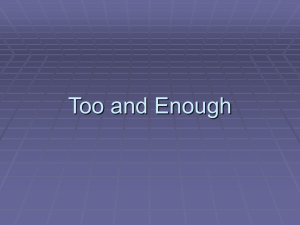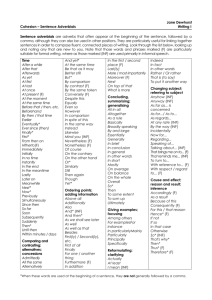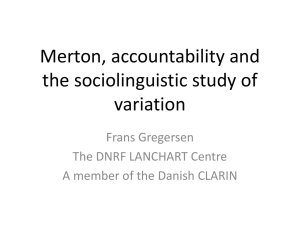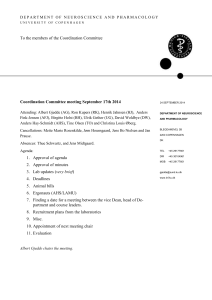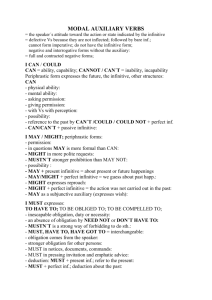INFORMATION SYSTEMS
advertisement
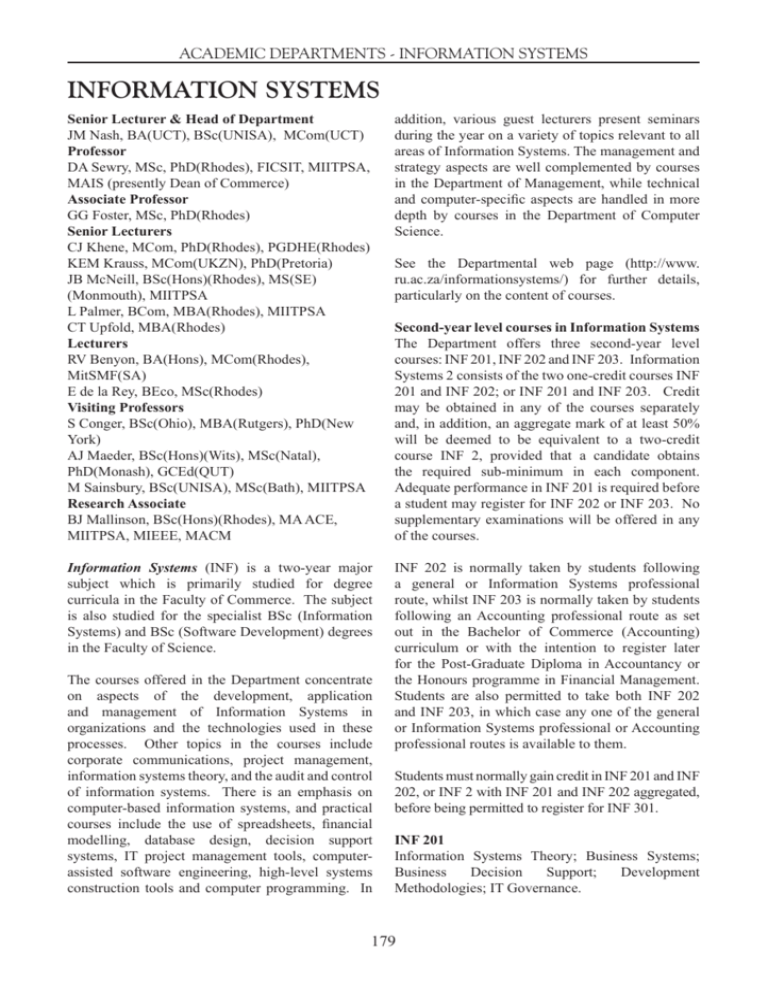
ACADEMIC DEPARTMENTS - INFORMATION SYSTEMS INFORMATION SYSTEMS Senior Lecturer & Head of Department JM Nash, BA(UCT), BSc(UNISA), MCom(UCT) Professor DA Sewry, MSc, PhD(Rhodes), FICSIT, MIITPSA, MAIS (presently Dean of Commerce) Associate Professor GG Foster, MSc, PhD(Rhodes) Senior Lecturers CJ Khene, MCom, PhD(Rhodes), PGDHE(Rhodes) KEM Krauss, MCom(UKZN), PhD(Pretoria) JB McNeill, BSc(Hons)(Rhodes), MS(SE) (Monmouth), MIITPSA L Palmer, BCom, MBA(Rhodes), MIITPSA CT Upfold, MBA(Rhodes) Lecturers RV Benyon, BA(Hons), MCom(Rhodes), MitSMF(SA) E de la Rey, BEco, MSc(Rhodes) Visiting Professors S Conger, BSc(Ohio), MBA(Rutgers), PhD(New York) AJ Maeder, BSc(Hons)(Wits), MSc(Natal), PhD(Monash), GCEd(QUT) M Sainsbury, BSc(UNISA), MSc(Bath), MIITPSA Research Associate BJ Mallinson, BSc(Hons)(Rhodes), MA ACE, MIITPSA, MIEEE, MACM addition, various guest lecturers present seminars during the year on a variety of topics relevant to all areas of Information Systems. The management and strategy aspects are well complemented by courses in the Department of Management, while technical and computer-specific aspects are handled in more depth by courses in the Department of Computer Science. Information Systems (INF) is a two-year major subject which is primarily studied for degree curricula in the Faculty of Commerce. The subject is also studied for the specialist BSc (Information Systems) and BSc (Software Development) degrees in the Faculty of Science. INF 202 is normally taken by students following a general or Information Systems professional route, whilst INF 203 is normally taken by students following an Accounting professional route as set out in the Bachelor of Commerce (Accounting) curriculum or with the intention to register later for the Post-Graduate Diploma in Accountancy or the Honours programme in Financial Management. Students are also permitted to take both INF 202 and INF 203, in which case any one of the general or Information Systems professional or Accounting professional routes is available to them. See the Departmental web page (http://www. ru.ac.za/informationsystems/) for further details, particularly on the content of courses. Second-year level courses in Information Systems The Department offers three second-year level courses: INF 201, INF 202 and INF 203. Information Systems 2 consists of the two one-credit courses INF 201 and INF 202; or INF 201 and INF 203. Credit may be obtained in any of the courses separately and, in addition, an aggregate mark of at least 50% will be deemed to be equivalent to a two-credit course INF 2, provided that a candidate obtains the required sub-minimum in each component. Adequate performance in INF 201 is required before a student may register for INF 202 or INF 203. No supplementary examinations will be offered in any of the courses. The courses offered in the Department concentrate on aspects of the development, application and management of Information Systems in organizations and the technologies used in these processes. Other topics in the courses include corporate communications, project management, information systems theory, and the audit and control of information systems. There is an emphasis on computer-based information systems, and practical courses include the use of spreadsheets, financial modelling, database design, decision support systems, IT project management tools, computerassisted software engineering, high-level systems construction tools and computer programming. In Students must normally gain credit in INF 201 and INF 202, or INF 2 with INF 201 and INF 202 aggregated, before being permitted to register for INF 301. INF 201 Information Systems Theory; Business Systems; Business Decision Support; Development Methodologies; IT Governance. 179 ACADEMIC DEPARTMENTS - INFORMATION SYSTEMS The examination for the INF 201 course consists of not more than two practical examinations of two hours, and one theory examination of three hours. Outside of examinations there are various other assessments (short presentations, essays, tests, practical assignments, etc.) which will contribute towards a semester class mark which is incorporated into the course assessment. INF 202 Information Systems Analysis; Application Architecture; Information Systems Design; Human Computer Interaction. The examination for the INF 202 course consists of not more than two practical examinations of two hours, and one theory examination of three hours. Outside of examinations there are various other assessments (short presentations, essays, tests, practical assignments, etc.) which will contribute towards a semester class mark which is incorporated into the course assessment. INF 203 Accounting Information Systems; Accounting Support Tools; Managing Projects; Accounting Information Systems Security and Control. The examination for the INF 203 course consists of not more than two practical examinations of two hours, and one theory examination of three hours. Outside of examinations there are various other assessments (short presentations, essays, tests, practical assignments, etc.) which will contribute towards a semester class mark which is incorporated into the course assessment. Third-year level courses in Information Systems Information Systems 3 consists of the two onecredit courses INF 301 and INF 302. Credit may be obtained in each course separately and, in addition, an aggregate mark of at least 50% will be deemed to be equivalent to a two-credit course INF 3, provided that a candidate obtains the required sub-minimum in each component. Adequate performance in INF 301 is required before a student may register for INF 302. No supplementary examinations will be offered in either course. INF 301 Databases; Programming Fundamentals; Requirements Management; Project Management; Project Communications. The examination for the INF 301 course consists of not more than two practical examinations of three hours, and two theory examinations of three hours. Every student is expected to research and submit a written assignment on a specific topic. This, in conjunction with other assessments (short presentations, tests, practical assignments, etc.) during the semester, contributes towards a semester class mark which is incorporated into the course assessment. INF 302 Data Manipulation; Application Development; Advanced Information Systems Theory; eBusiness. The examination for the INF 302 course consists of not more than two practical examinations of three hours, and two theory examinations of three hours. Every student is expected to complete a specific group systems development project. This, in conjunction with other assessments (short presentations, tests, practical assignments, etc.) during the semester, contributes towards a semester class mark which is incorporated into the course assessment. Fourth-year level courses in Information Systems INF 4 This course is offered by the departments of Information Systems and Computer Science in conjunction, and is taken by students following the BSc(Software Development) curriculum. The course consists of various modules covering a range of Software Engineering topics, including formal methods, unit-testing and IS management, as well as electives from the Computer Science and Information Systems Honours modules, dependent on staff availability. There may be a practical internship module. In addition, there may be written essays and a series of seminars throughout the year, which cover a range of general topics in Software Engineering. Students are also required to undertake a software development project and a research project. 180 ACADEMIC DEPARTMENTS - INFORMATION SYSTEMS Admission Prerequisites Modules offered by the Department include: INF 201 CSC 112 Candidates deemed to be in their first year of study are not permitted to register for INF 201 • Core modules: Information Systems Management; Enterprise Architecture. • Elective modules (a selection of the following modules will be offered in any one year, subject to a minimum number of students per module and staff availability): Business Analysis; Business Intelligence; Data Warehousing; Design Patterns; Health Informatics; ICT for Development; Internship (subject to available placements); Mobile Technologies; Software Testing; Virtual Collaboration. • Supporting modules: Corporate Communications; Research Planning and Design. INF 202 sub-minimum in INF 201 INF 203 sub-minimum in INF 201 INF 301 INF 201 and INF 202 or INF 2 with INF 201 and INF 202 aggregated INF 302 sub-minimum in INF 301 INF 4 INF 301 and INF 302, or INF 3 with INF 301 and INF 302 aggregated INFORMATION SYSTEMS HONOURS The Honours course is a one-year, full-time programme and consists of a coursework component and a project component. Students may also register for joint Honours in which the honours programmes of two departments, for example Information Systems and Management, are taken 60%:40% with some coursework and some project components selected from each department. Coursework component Students must take all the core and supporting modules, and an agreed selection of the elective modules. In the case of electives, a student may take any one equivalently weighted Honours level module from another department, provided that it is approved by the Head of Department, in consultation with the Head of the other department. In addition to the modules listed above, students are required to attend any other activities as may be deemed appropriate by the Head of Department. Project component All students are required to undertake a Research Project in a given area and to produce a written report. Additionally, students are required to undertake a major Systems Development Project in which a prototype information system is developed for a client. INFORMATION SYSTEMS MASTERS and DOCTORAL DEGREES Suitably qualified students are encouraged to proceed to the research degrees of MCom, MSc and PhD under the supervision of staff in the Department. Requirements for these degrees are given in the General Regulations. 181
